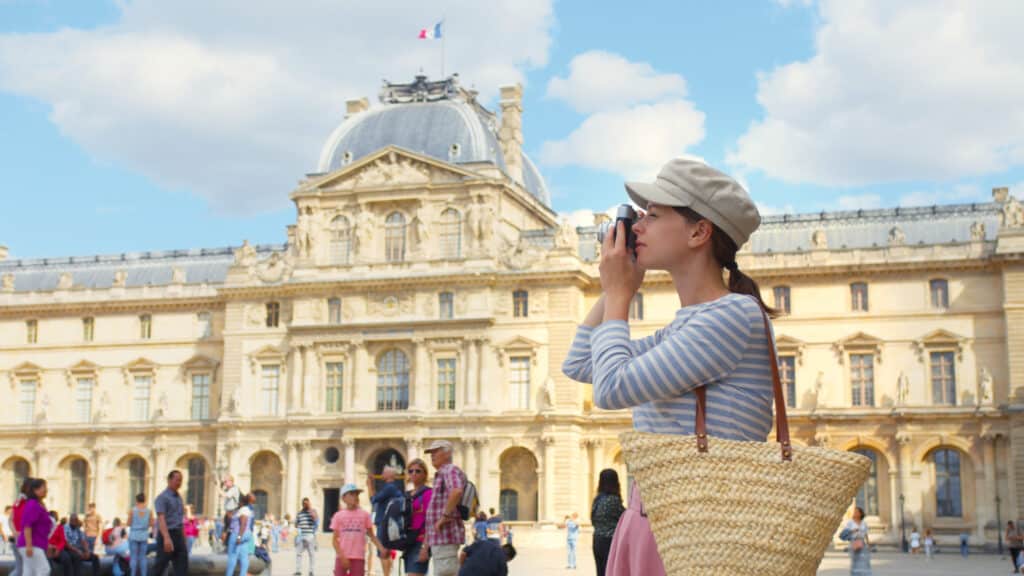
The entrance fee for the Louvre Museum is 22€ for the year 2025. Children under 18, as well as European Economic Area residents under 26, can enter free of charge. Currently, there are no seasonal price variations, and seniors who do not fall under these categories also pay the standard rate. The Louvre typically welcomes visitors from 9:00 AM to 6:00 PM every day except Tuesdays, with extended hours on Fridays until 9:45 PM. We visited the museum on December 15, 2024, and this information is valid as of that date.
A Closer Look at the Louvre Museum
We find the Louvre Museum to be one of the most significant cultural landmarks in the world—not only because of its vast collection but also due to its rich history that dates back to the medieval period. Originally constructed in the late 12th century as a fortress under King Philippe Auguste, the Louvre evolved over the centuries into a royal palace, eventually becoming the museum we know today. Walking through its corridors, we can still spot architectural remnants of the old fortress walls, especially in the Sully Wing’s lower levels, reminding us of the building’s layered past.
We think it’s helpful to understand the museum’s layout before stepping inside. The Louvre’s collection is housed in three major wings: Denon, Richelieu, and Sully. Each wing hosts a variety of departments, including the Department of Near Eastern Antiquities, the Department of Egyptian Antiquities, and the Department of Paintings, among others. In our opinion, it’s wise to decide which sections to prioritize if you’re on a tight schedule—this museum is enormous, and there’s enough art to fill multiple visits.
Highlights and Must-See Masterpieces
Among the countless masterpieces, the Mona Lisa by Leonardo da Vinci remains the most famous resident of the Louvre, and we find the atmosphere around this painting to be truly electric. Just a short distance away, the Winged Victory of Samothrace stands triumphantly at the top of a grand staircase, while the Venus de Milo is showcased nearby, captivating visitors with its ancient beauty. You’ll also encounter famous French paintings like Liberty Leading the People by Eugène Delacroix, which embodies the spirit of the French Revolution.
We recommend setting aside at least half a day to wander through the galleries without rushing. In our view, planning specific artworks you want to see helps manage your time, but it can also be exciting to let yourself get lost in the maze of corridors—sometimes the unexpected discoveries leave the strongest impressions.
Dining, Shopping, and Nearby Attractions
After exploring room upon room of priceless art, hunger is bound to strike. We find several convenient dining options within the Carrousel du Louvre shopping area, located just beneath the famous glass pyramid. This spot also offers a range of boutiques and souvenir shops where you can pick up postcards, art prints, or even replicas of your favorite sculptures. If you crave a more traditional Parisian meal, there are various bistros and cafés a short walk away, allowing you to soak up the city’s charming streets on your way.
Right outside the Louvre, the Tuileries Garden provides a peaceful haven where you can take a breather, snap a few photos, or relax by the ponds. For those eager to continue their art journey, the Musée d’Orsay lies across the Seine, housed in a former railway station and featuring an impressive collection of Impressionist works. In our opinion, pairing a visit to the Louvre with a walk through the Tuileries and onward to the Musée d’Orsay makes for a well-rounded cultural experience.
Practical Tips and Personal Thoughts
We find it beneficial to purchase tickets online in advance to avoid waiting in long queues, especially during peak tourist seasons. Arriving early can also make a difference in how crowded each gallery feels. Comfortable shoes are a must—there’s nothing worse than trying to appreciate iconic paintings while your feet are aching. Bringing a small notebook or using your phone to jot down favorites can help you remember those hidden gems you stumbled upon.
Even if art history isn’t your main passion, the sheer scope and scale of the Louvre can be awe-inspiring. It’s like traveling through time, with each gallery painting a different picture of human creativity, ambition, and beauty. As a team, we left with the feeling that, even after hours of wandering, we had only scratched the surface of what the Louvre has to offer. We believe that if you have the opportunity to visit again—and we sincerely hope you do—you’ll discover new corners and treasures on each visit.

